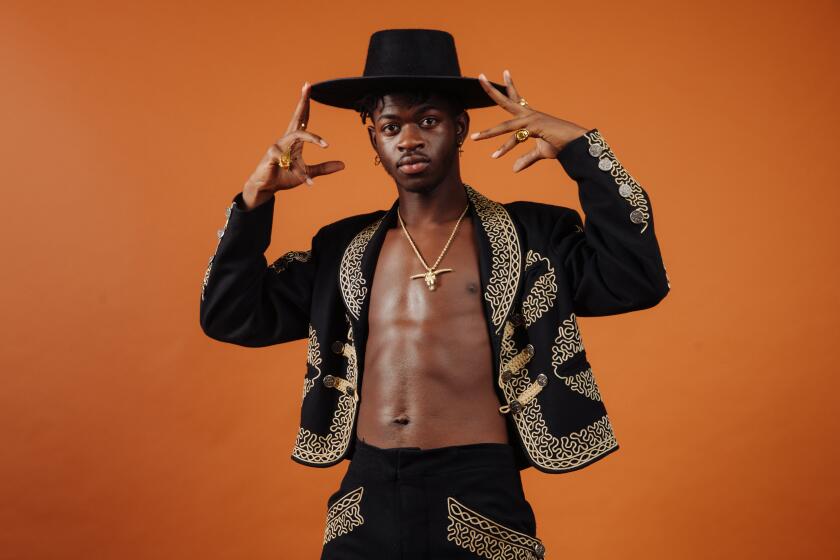Dua Lipa is a pop star with no lore on ‘Radical Optimism’

- Share via
Dua Lipa’s “Radical Optimism” has a hilarious album cover, two songs about illusionists and what may end up the year’s most succulent bass playing. What it doesn’t have is the kind of detailed celebrity meta-narrative that’s come to define — and to propel — the superstar pop LP in music’s parasocial age.
The 28-year-old London-born singer might disagree: On the cusp of her Saturn return, Lipa has been talking up her third studio album as a meditation on hard-won emotional maturity à la Ariana Grande’s “Eternal Sunshine” or Kacey Musgraves’ “Deeper Well.” “Radical optimism in the way that I see it,” she told Zane Lowe, “is this idea of rolling with the punches.” The LP’s cover shows her bobbing in the sea dangerously close to a shark’s fin, and I guess the shark represents the punches?
Yet because Lipa’s lyrics are very bad — “If these walls could talk, they’d tell us to break up,” she sings at one point — this concept doesn’t really come together. And, besides, a quest for emotional maturity really misses the whole point of Dua Lipa, which is being coolly above it all in the pursuit of earthly pleasure. Her celebrity lore, to the extent that it exists, revolves around her identity as the Vacanza Queen, as she’s known on social media thanks to her fabulous Instagram photo dumps.

So “Radical Optimism” raises an interesting question: In this era of the endlessly annotated “The Tortured Poets Department” — not to mention the downright scholarly “Cowboy Carter” — can a pop album succeed without functioning as a referendum on fame or as a work of musicology? Is it enough just to deliver a bunch of loosely connected bangers and bops?
At its best, “Radical Optimism” answers yes — or at least makes you want the answer to be yes. Lipa has style and attitude to spare; her singing is sly, throaty, slightly Bond-girl conspiratorial. Working with a crafty studio team led by Andrew Wyatt (who co-wrote and co-produced Lipa’s “Barbie” smash “Dance the Night”) and Tame Impala’s Kevin Parker, she fills these 11 songs with a wonderful array of sounds and textures: tick-tocking drums, silky guitars, synths that sparkle and growl. And those bass lines! Truly nasty stuff.
Despite Lipa’s proclamation in a recent interview with The Times that she’d moved away from disco, the album is firmly rooted on the dance floor, though it does lean more toward live instrumentation than 2020’s Grammy-winning “Future Nostalgia.” “These Walls” is a shimmering soft-rock jam with echoes of Fleetwood Mac, while “Anything for Love” starts out as a spare piano ballad before blossoming into chewy, “Off the Wall”-ish funk.

The songs are about learning to understand the limits of romance. But we know so little about Lipa’s personal life as compared to Grande’s or Taylor Swift’s, for instance, that her comically dull revelations carry no charge. Here’s how she describes arriving at a state of post-breakup acceptance in “Happy for You”:
Late on a Tuesday, I saw your picture
You were so happy, I could just tell
She’s really pretty, I think she’s a model
Baby, together you look hot as hell
On the other hand, there’s something deeply refreshing about the opportunity “Radical Optimism” offers to ignore all the superstar mythologizing and simply take in Lipa’s music as theater — to savor its energy and color the way we once did ABBA, to name one clear influence from a time when music made far more room for fantasy. (See also: Tori Kelly’s “Tori,” a vivid and inviting new pop album that exists almost entirely outside the celebrity-industrial complex.)
None of the singles from “Radical Optimism” have burned up the charts yet: “Illusion,” the album’s latest, sits at No. 78 this week on Billboard’s Hot 100, while “Houdini” fell off the tally after only a few months — a startlingly short run given the year-plus Lipa clocked with “Levitating” and “Don’t Start Now.” But those songs came before the full footnote-ification of pop that arguably began with Swift’s so-called Taylor’s Versions of her old albums. Now everything is a text to be scrutinized, whether the work can bear it or not.
More to Read
The biggest entertainment stories
Get our big stories about Hollywood, film, television, music, arts, culture and more right in your inbox as soon as they publish.
You may occasionally receive promotional content from the Los Angeles Times.











